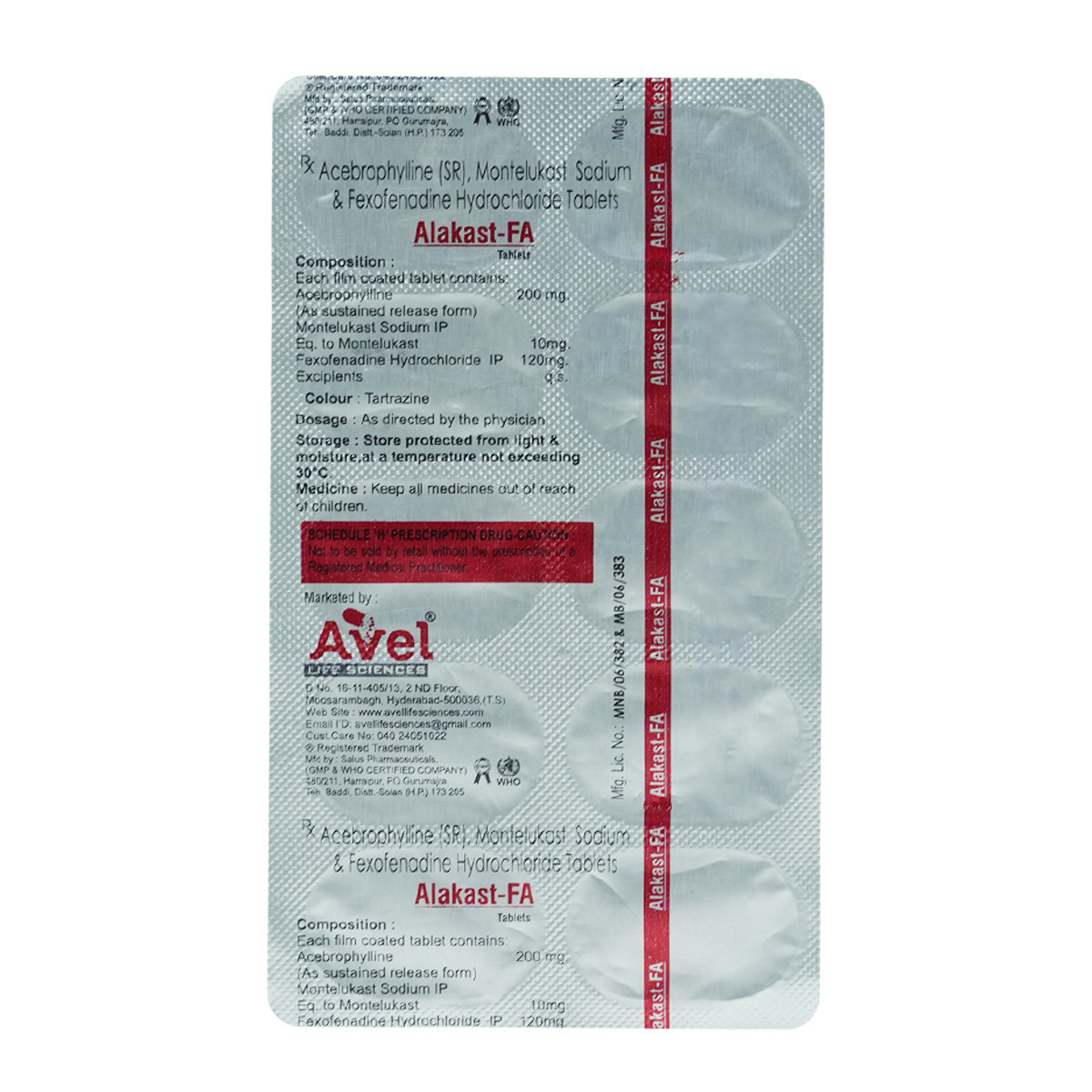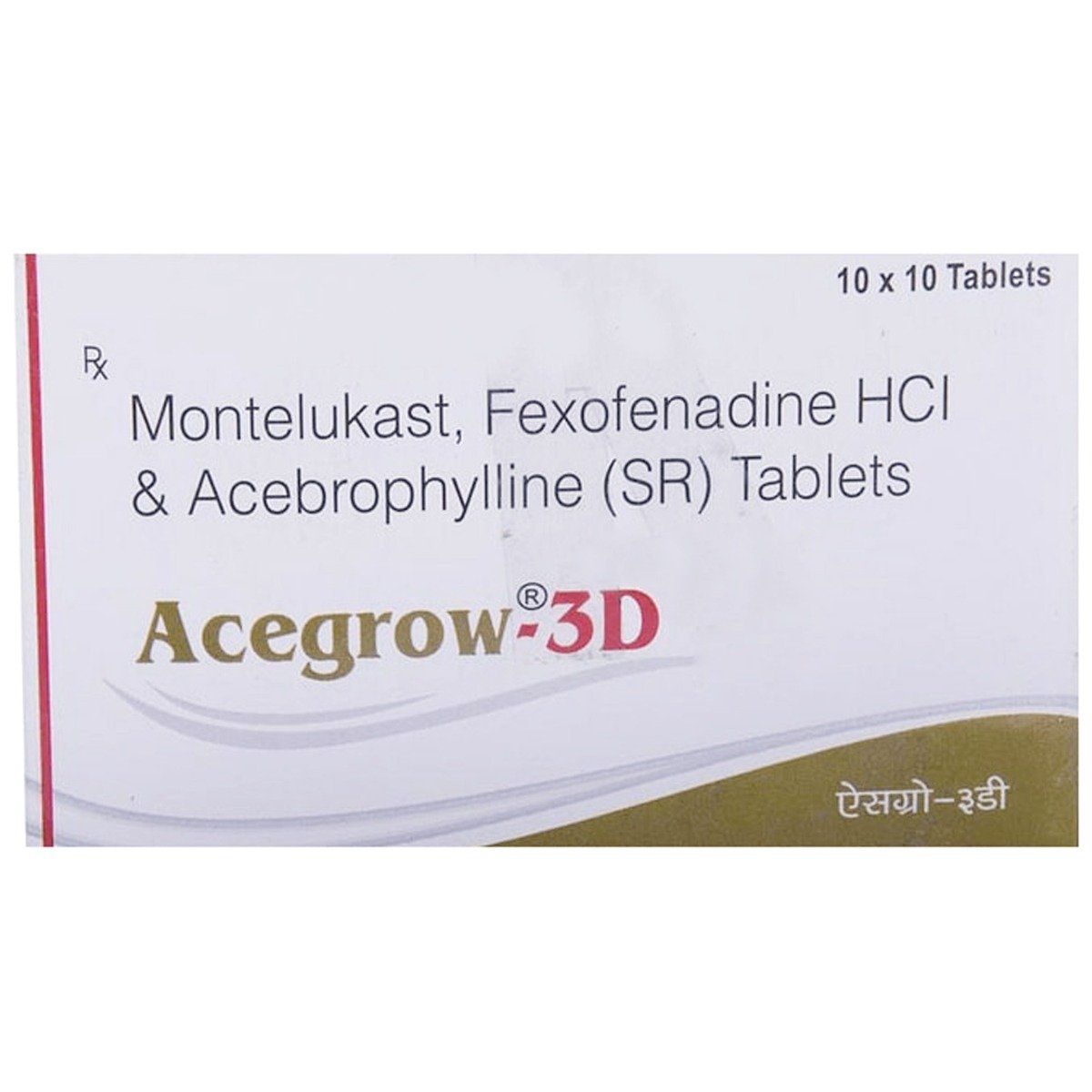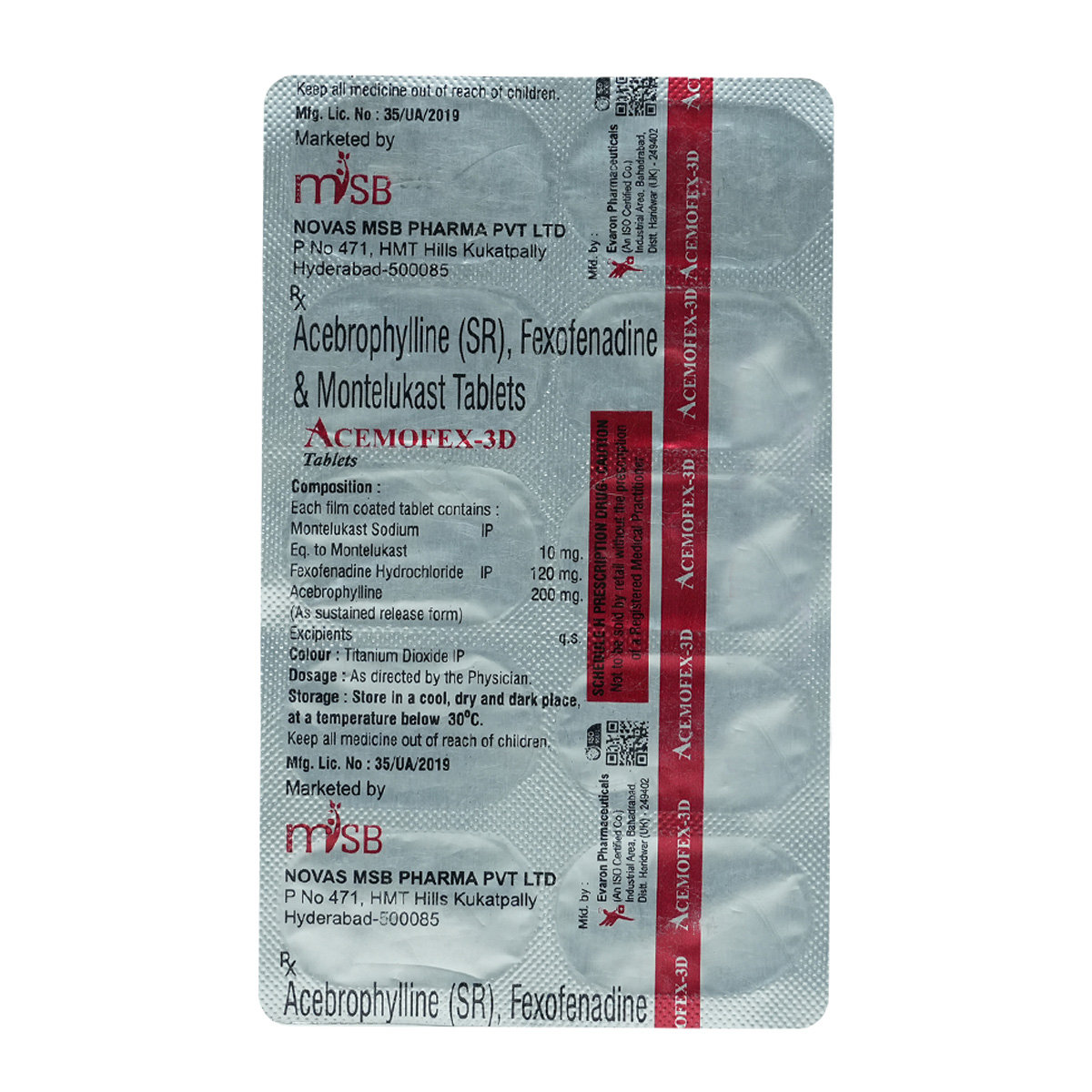Acebrophylline+fexofenadine+montelukast
About Acebrophylline+fexofenadine+montelukast
Acebrophylline+fexofenadine+montelukast is used to prevent asthma and treat allergic symptoms such as sneezing, runny nose, congestion, stuffy nose, or watery eyes. Asthma is a chronic (long-term) respiratory condition in which airways narrow, swell, and produce extra mucus, leading to difficulty in breathing. An allergy is a condition that occurs when the immune system reacts to a foreign substance that is typically not harmful to your body. These foreign substances are known as ‘allergens.’
Acebrophylline+fexofenadine+montelukast is a combination of three drugs, namely: Acebrophylline (mucolytic), Montelukast (leukotriene receptor antagonist), and Fexofenadine hydrochloride (antihistamine). Acebrophylline is a mucolytic (cough/sputum thinner) agent that helps in thinning and loosening phlegm (mucus) in the lungs, windpipe, and nose. Montelukast works by blocking the action of chemicals called leukotrienes that are released from the lungs, causing inflammation (swelling) and increased mucus production in the airways. Thereby, reducing inflammation, mucus production, and narrowing in the airways. Fexofenadine hydrochloride belongs to the class of antihistamines (anti-allergic drugs) that works by blocking the action of histamine, a substance responsible for causing allergic reactions.
Take Acebrophylline+fexofenadine+montelukast as prescribed. Your doctor will decide the dose and the duration of Acebrophylline+fexofenadine+montelukast use based on your medical condition. Some people may experience a skin rash, diarrhoea, nausea, vomiting, heartburn, and stomach discomfort. Most of these side effects of Acebrophylline+fexofenadine+montelukast do not require medical attention and gradually resolve over time. However, if the side effects persist or worsen, please consult your doctor.
If you are known to be allergic to Acebrophylline+fexofenadine+montelukast or any other medicines, please tell your doctor. If you are pregnant or breastfeeding, it is advised to inform your doctor before using Acebrophylline+fexofenadine+montelukast. Acebrophylline+fexofenadine+montelukast is not recommended for children unless advised by a doctor. Avoid alcohol consumption with Acebrophylline+fexofenadine+montelukast as it may increase drowsiness. Drive only if you are alert as Acebrophylline+fexofenadine+montelukast may cause drowsiness or dizziness in some people. It is advised to maintain 2 hours gap between taking Acebrophylline+fexofenadine+montelukast and indigestion remedies containing magnesium and aluminium as taking these medicines at the same time may reduce the absorption of Acebrophylline+fexofenadine+montelukast.
Uses of Acebrophylline+fexofenadine+montelukast
Medicinal Benefits
Acebrophylline+fexofenadine+montelukast contains Acebrophylline, Montelukast, and Fexofenadine hydrochloride, which prevent asthma and treat allergic symptoms. Acebrophylline is a cough/sputum thinner that helps in thinning and loosening phlegm (mucus) in the lungs, windpipe, and nose. Thereby helps to cough out easily and makes breathing easier by opening airways. Montelukast reduces inflammation, mucus production, and narrowing in the airways. Fexofenadine hydrochloride is an anti-allergic drug that blocks the action of histamine, a substance responsible for causing allergic reactions. It helps to provide relief from symptoms of allergy such as sneezing, running nose, watery eyes, itching, swelling, and congestion or stiffness.
Directions for Use
Storage
Side Effects of Acebrophylline+fexofenadine+montelukast
- Diarrhoea
- Nausea
- Vomiting
- Skin rash
- Heartburn
- Stomach discomfort
Drug Warnings
If you are known to be allergic to Acebrophylline+fexofenadine+montelukast or any other medicines, please tell your doctor. If you are pregnant or breastfeeding, it is advised to inform your doctor before using Acebrophylline+fexofenadine+montelukast. Acebrophylline+fexofenadine+montelukast is not recommended for children unless advised by a doctor. Avoid alcohol consumption with Acebrophylline+fexofenadine+montelukast as it may increase drowsiness. Drive only if you are alert as Acebrophylline+fexofenadine+montelukast may cause drowsiness or dizziness in some people. If you notice changes in mood causing depression, self-harming thoughts or aggressive behaviour while taking Acebrophylline+fexofenadine+montelukast, please consult a doctor immediately. It is advised to maintain 2 hours gap between taking Acebrophylline+fexofenadine+montelukast and indigestion remedies containing magnesium and aluminium as taking these medicines at the same time may reduce the absorption of Acebrophylline+fexofenadine+montelukast. Regular monitoring of potassium levels is recommended while taking Acebrophylline+fexofenadine+montelukast as it may cause low potassium levels in the blood.
Drug Interactions
Drug-Drug Interaction: Acebrophylline+fexofenadine+montelukast may interact with water pills (furosemide), medicines used to treat gout (allopurinol), antacid (cimetidine), drugs used to lower high blood pressure (diltiazem, verapamil), heart-related medicines (isoprenaline), anthelmintic (thiabendazole), corticosteroids (prednisone), oral contraceptives (ethinylestradiol), drugs used to treat high lipid levels (gemfibrozil), antibiotics (rifampicin, erythromycin, ciprofloxacin, amoxicillin, doxycycline), anticonvulsants (phenytoin, phenobarbital) and antifungals (ketoconazole),
Drug-Food Interaction: Avoid taking Acebrophylline+fexofenadine+montelukast with certain fruit juices such as orange, apple, and grapefruit as it may reduce the effectiveness of Acebrophylline+fexofenadine+montelukast. Avoid or limit the intake of caffeine with Acebrophylline+fexofenadine+montelukast as it may increase side effects. Also, avoid intake of alcohol with Acebrophylline+fexofenadine+montelukast as it may increase drowsiness.
Drug-Disease Interaction: If you have low blood pressure, irregular heartbeats, hemodynamic instability (unstable blood pressure), had heart attack, Lapp lactase deficiency, galactose intolerance or glucose-galactose malabsorption, fits, hyperthyroidism (overactive thyroid), viral infections, heart failure, high blood pressure, gastric or duodenal ulcers, kidney, liver or heart problems, inform your doctor before taking Acebrophylline+fexofenadine+montelukast.
Drug-Drug Interactions Checker List:
Safety Advice

Alcohol
unsafeAvoid consumption of alcohol while using Acebrophylline+fexofenadine+montelukast as it may increase drowsiness.

Pregnancy
cautionThe safety of Acebrophylline+fexofenadine+montelukast in pregnant women is unknown. However, if you are pregnant, consult your doctor before using Acebrophylline+fexofenadine+montelukast. Your doctor may prescribe this medicine if the benefits outweigh the risks.

Breast Feeding
cautionIt is unknown whether Acebrophylline+fexofenadine+montelukast is excreted in human milk. However, if you are breastfeeding, consult your doctor before using Acebrophylline+fexofenadine+montelukast. Your doctor may prescribe this medicine if the benefits outweigh the risks.

Driving
cautionAcebrophylline+fexofenadine+montelukast may cause dizziness or drowsiness in some people. Therefore, drive only if you are alert after taking Acebrophylline+fexofenadine+montelukast.

Liver
cautionTake Acebrophylline+fexofenadine+montelukast with caution, especially if you have a history of Liver diseases/conditions or pre-existing liver problems. The dose may be adjusted by your doctor as required.

Kidney
cautionTake Acebrophylline+fexofenadine+montelukast with caution, especially if you have a history of Kidney diseases/conditions or pre-existing kidney problems. The dose may be adjusted by your doctor as required.

Children
cautionAcebrophylline+fexofenadine+montelukast is not recommended for children unless a doctor advises.
Habit Forming
Diet & Lifestyle Advise
- Add ginger to foods or tea as it contains some anti-inflammatory compounds that can relax membranes in the airways and reduce cough, irritation, and swelling in nasal passages.
- Eat foods rich in potassium, such as tomatoes, bananas, asparagus, oranges, potatoes, avocados, dark leafy greens, and beetroot, as potassium is important for lung function, and a potassium deficiency may cause breathing problems.
- Avoid foods such as cabbage, beans, garlic, onions, shrimp, pickled food, dried fruits, fried foods, carbonated drinks, wine, bottled lemon, and lime juice, as it may worsen asthma symptoms.
- Staying hydrated is vital for those with a cough or cold. Drink liquids at room temperature to get relief from runny nose, cough, and sneezing.
- The immune system is affected by stress and raises the risk of being sick. Do meditation, deep breathing, regular exercise, and try progressive muscle relaxation techniques to get relief from stress.
- Quit smoking as it may reduce the effectiveness of the Acebrophylline+fexofenadine+montelukast and irritate the lungs worsening breathing problems.
- It is advised to avoid contact with known allergens (allergy-causing agents) such as pollen, dust, etc. Also, certain food items are known to cause allergies to you.
- Maintain personal hygiene and keep your surroundings clean.
Patients Concern
Disease/Condition Glossary
Asthma: It is a chronic (long-term) respiratory condition in which airways narrow, swell, and produce extra mucus, leading to difficulty in breathing. The symptoms of asthma include wheezing (whistling sound while breathing), shortness of breath, chest tightness, and cough, especially at night. The symptoms of mild persistent asthma may occur more than 2 times in a week and up to 4 nights in a month, whereas, in the case of severe persistent asthma, the symptoms occur several times every day and most nights. The treatment for asthma includes medication, breathing exercises, and self-care.
Allergy: It is a condition that occurs when the immune system reacts to a foreign substance that is typically not harmful to your body. These foreign substances are known as ‘allergens.’ Allergic condition varies from person to person. Some might be allergic to certain foods and seasonal allergies like hay fever, pollen, or pet dander. One of the main symptoms of allergy is cough, and it acts as a reflex action in the throat when there is any mucus or foreign irritant entry into the respiratory system.
FAQs
Acebrophylline+fexofenadine+montelukast contains Acebrophylline, Montelukast, and Fexofenadine hydrochloride. Acebrophylline helps in thinning and loosening phlegm (mucus) in the lungs, windpipe, and nose. Montelukast reduces inflammation, mucus production, and narrowing in the airways. Fexofenadine hydrochloride is an anti-allergic drug that helps to provide relief from symptoms of allergy such as sneezing, running nose, watery eyes, itching, swelling, congestion, or stiffness. Thus, the contents of Acebrophylline+fexofenadine+montelukast help prevent asthma and treat allergic symptoms.
You are recommended to avoid taking Acebrophylline+fexofenadine+montelukast with fruit juices such as orange, apple or grapefruit as they may reduce the effectiveness of Acebrophylline+fexofenadine+montelukast. Therefore, it is advised to take Acebrophylline+fexofenadine+montelukast with water for maximum benefits.
No, Acebrophylline+fexofenadine+montelukast is not used to treat asthma attacks. Acebrophylline+fexofenadine+montelukast is used to prevent asthma and treat allergic symptoms. Therefore, it is recommended to carry a rescue inhaler always to treat asthma attacks.
You are not recommended to take erythromycin with Acebrophylline+fexofenadine+montelukast as co-administration of these medicines may worsen the adverse effects of Acebrophylline+fexofenadine+montelukast. However, please consult your doctor before using other medicines with Acebrophylline+fexofenadine+montelukast.
No, you are not recommended to smoke while taking Acebrophylline+fexofenadine+montelukast as it may reduce the effectiveness of Acebrophylline+fexofenadine+montelukast.





